Orientation & Reflective Learning: Strategies for Success in Higher Ed
VerifiedAdded on 2023/06/11
|6
|1932
|148
Report
AI Summary
This report provides an overview of reflective learning and its importance in higher education, emphasizing how it helps students identify strengths and weaknesses. It delves into the Gibbs reflective cycle, detailing its six stages: Description, Feelings, Evaluation, Analysis, Conclusion, and Action Plan. The report further discusses the significance of feedback and feed-forward processes in improving student performance, highlighting their role in formative and summative assessments. It concludes that reflective learning, combined with effective feedback mechanisms, is crucial for students to achieve their academic goals and prepare for future challenges. Desklib offers more resources and solved assignments for students.
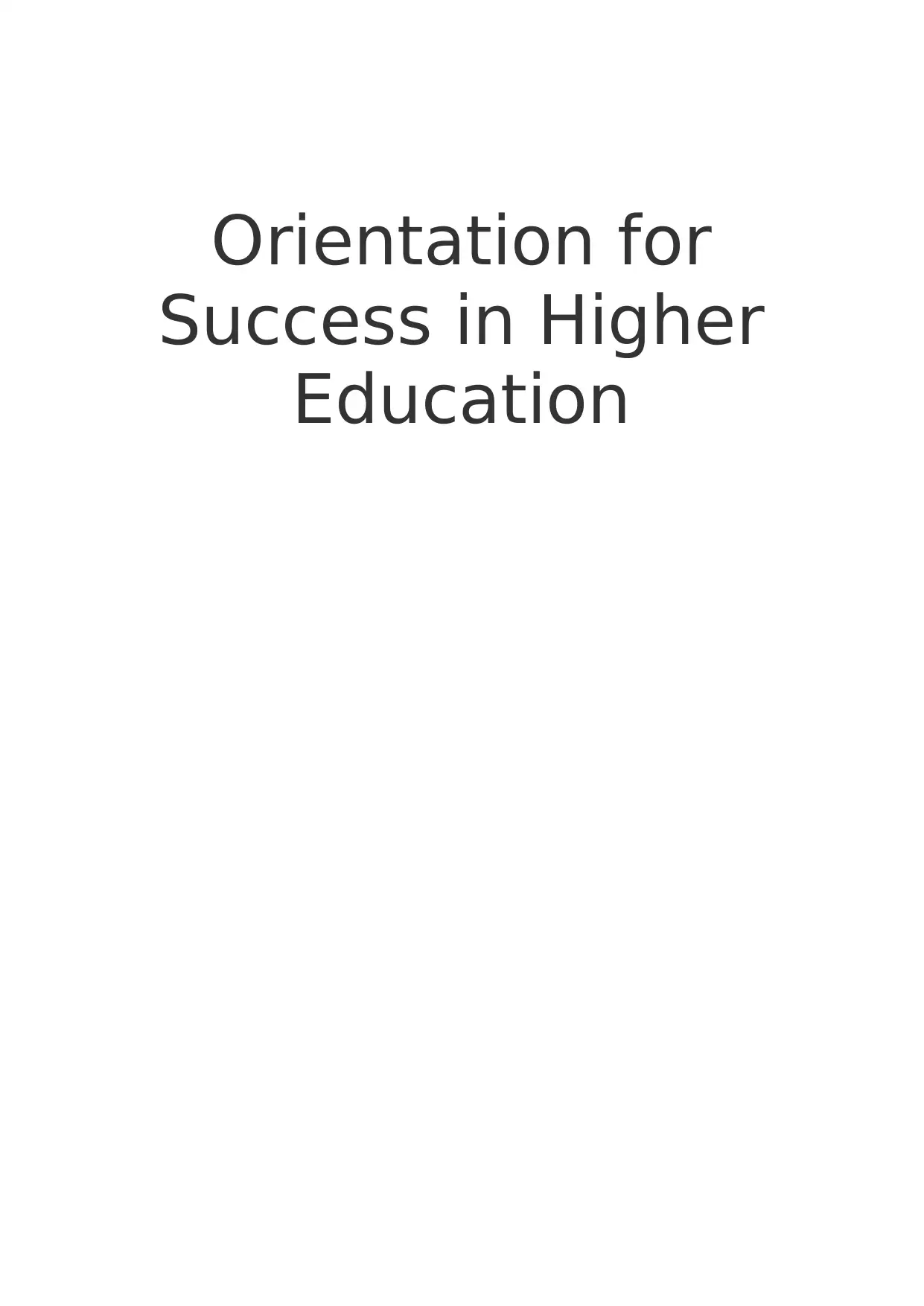
Orientation for
Success in Higher
Education
Success in Higher
Education
Paraphrase This Document
Need a fresh take? Get an instant paraphrase of this document with our AI Paraphraser
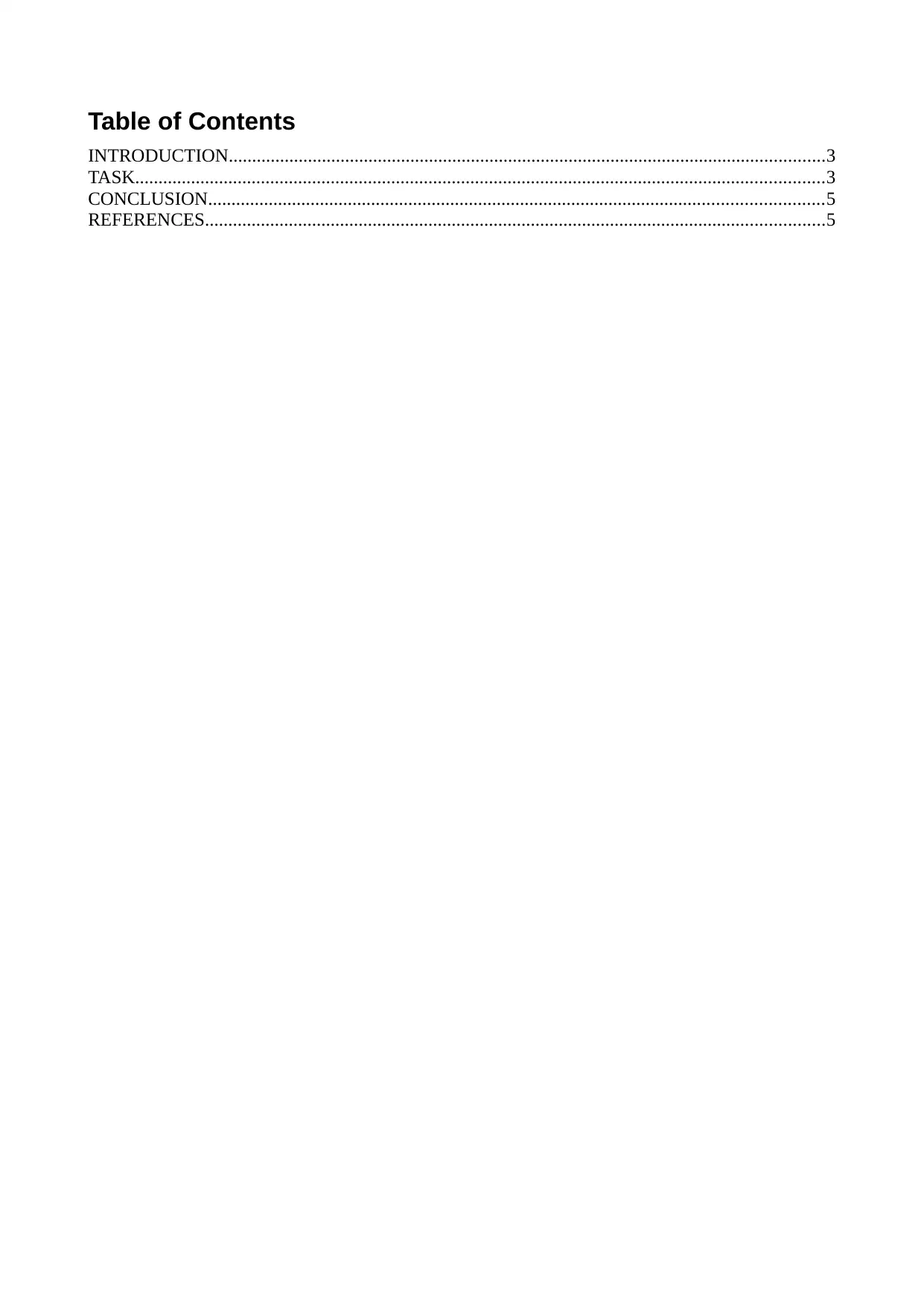
Table of Contents
INTRODUCTION................................................................................................................................3
TASK....................................................................................................................................................3
CONCLUSION....................................................................................................................................5
REFERENCES.....................................................................................................................................5
INTRODUCTION................................................................................................................................3
TASK....................................................................................................................................................3
CONCLUSION....................................................................................................................................5
REFERENCES.....................................................................................................................................5
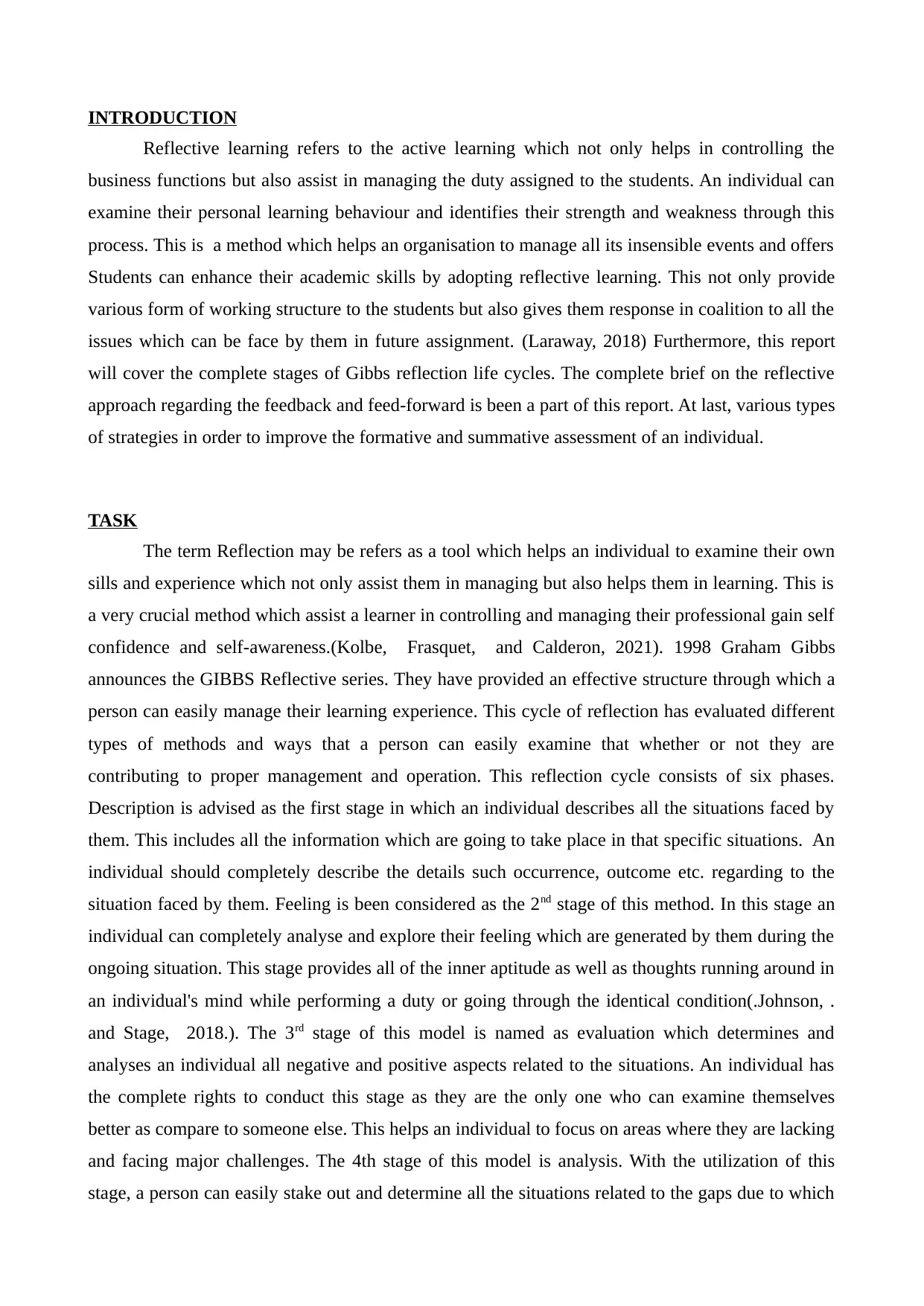
INTRODUCTION
Reflective learning refers to the active learning which not only helps in controlling the
business functions but also assist in managing the duty assigned to the students. An individual can
examine their personal learning behaviour and identifies their strength and weakness through this
process. This is a method which helps an organisation to manage all its insensible events and offers
Students can enhance their academic skills by adopting reflective learning. This not only provide
various form of working structure to the students but also gives them response in coalition to all the
issues which can be face by them in future assignment. (Laraway, 2018) Furthermore, this report
will cover the complete stages of Gibbs reflection life cycles. The complete brief on the reflective
approach regarding the feedback and feed-forward is been a part of this report. At last, various types
of strategies in order to improve the formative and summative assessment of an individual.
TASK
The term Reflection may be refers as a tool which helps an individual to examine their own
sills and experience which not only assist them in managing but also helps them in learning. This is
a very crucial method which assist a learner in controlling and managing their professional gain self
confidence and self-awareness.(Kolbe, Frasquet, and Calderon, 2021). 1998 Graham Gibbs
announces the GIBBS Reflective series. They have provided an effective structure through which a
person can easily manage their learning experience. This cycle of reflection has evaluated different
types of methods and ways that a person can easily examine that whether or not they are
contributing to proper management and operation. This reflection cycle consists of six phases.
Description is advised as the first stage in which an individual describes all the situations faced by
them. This includes all the information which are going to take place in that specific situations. An
individual should completely describe the details such occurrence, outcome etc. regarding to the
situation faced by them. Feeling is been considered as the 2nd stage of this method. In this stage an
individual can completely analyse and explore their feeling which are generated by them during the
ongoing situation. This stage provides all of the inner aptitude as well as thoughts running around in
an individual's mind while performing a duty or going through the identical condition(.Johnson, .
and Stage, 2018.). The 3rd stage of this model is named as evaluation which determines and
analyses an individual all negative and positive aspects related to the situations. An individual has
the complete rights to conduct this stage as they are the only one who can examine themselves
better as compare to someone else. This helps an individual to focus on areas where they are lacking
and facing major challenges. The 4th stage of this model is analysis. With the utilization of this
stage, a person can easily stake out and determine all the situations related to the gaps due to which
Reflective learning refers to the active learning which not only helps in controlling the
business functions but also assist in managing the duty assigned to the students. An individual can
examine their personal learning behaviour and identifies their strength and weakness through this
process. This is a method which helps an organisation to manage all its insensible events and offers
Students can enhance their academic skills by adopting reflective learning. This not only provide
various form of working structure to the students but also gives them response in coalition to all the
issues which can be face by them in future assignment. (Laraway, 2018) Furthermore, this report
will cover the complete stages of Gibbs reflection life cycles. The complete brief on the reflective
approach regarding the feedback and feed-forward is been a part of this report. At last, various types
of strategies in order to improve the formative and summative assessment of an individual.
TASK
The term Reflection may be refers as a tool which helps an individual to examine their own
sills and experience which not only assist them in managing but also helps them in learning. This is
a very crucial method which assist a learner in controlling and managing their professional gain self
confidence and self-awareness.(Kolbe, Frasquet, and Calderon, 2021). 1998 Graham Gibbs
announces the GIBBS Reflective series. They have provided an effective structure through which a
person can easily manage their learning experience. This cycle of reflection has evaluated different
types of methods and ways that a person can easily examine that whether or not they are
contributing to proper management and operation. This reflection cycle consists of six phases.
Description is advised as the first stage in which an individual describes all the situations faced by
them. This includes all the information which are going to take place in that specific situations. An
individual should completely describe the details such occurrence, outcome etc. regarding to the
situation faced by them. Feeling is been considered as the 2nd stage of this method. In this stage an
individual can completely analyse and explore their feeling which are generated by them during the
ongoing situation. This stage provides all of the inner aptitude as well as thoughts running around in
an individual's mind while performing a duty or going through the identical condition(.Johnson, .
and Stage, 2018.). The 3rd stage of this model is named as evaluation which determines and
analyses an individual all negative and positive aspects related to the situations. An individual has
the complete rights to conduct this stage as they are the only one who can examine themselves
better as compare to someone else. This helps an individual to focus on areas where they are lacking
and facing major challenges. The 4th stage of this model is analysis. With the utilization of this
stage, a person can easily stake out and determine all the situations related to the gaps due to which
⊘ This is a preview!⊘
Do you want full access?
Subscribe today to unlock all pages.

Trusted by 1+ million students worldwide
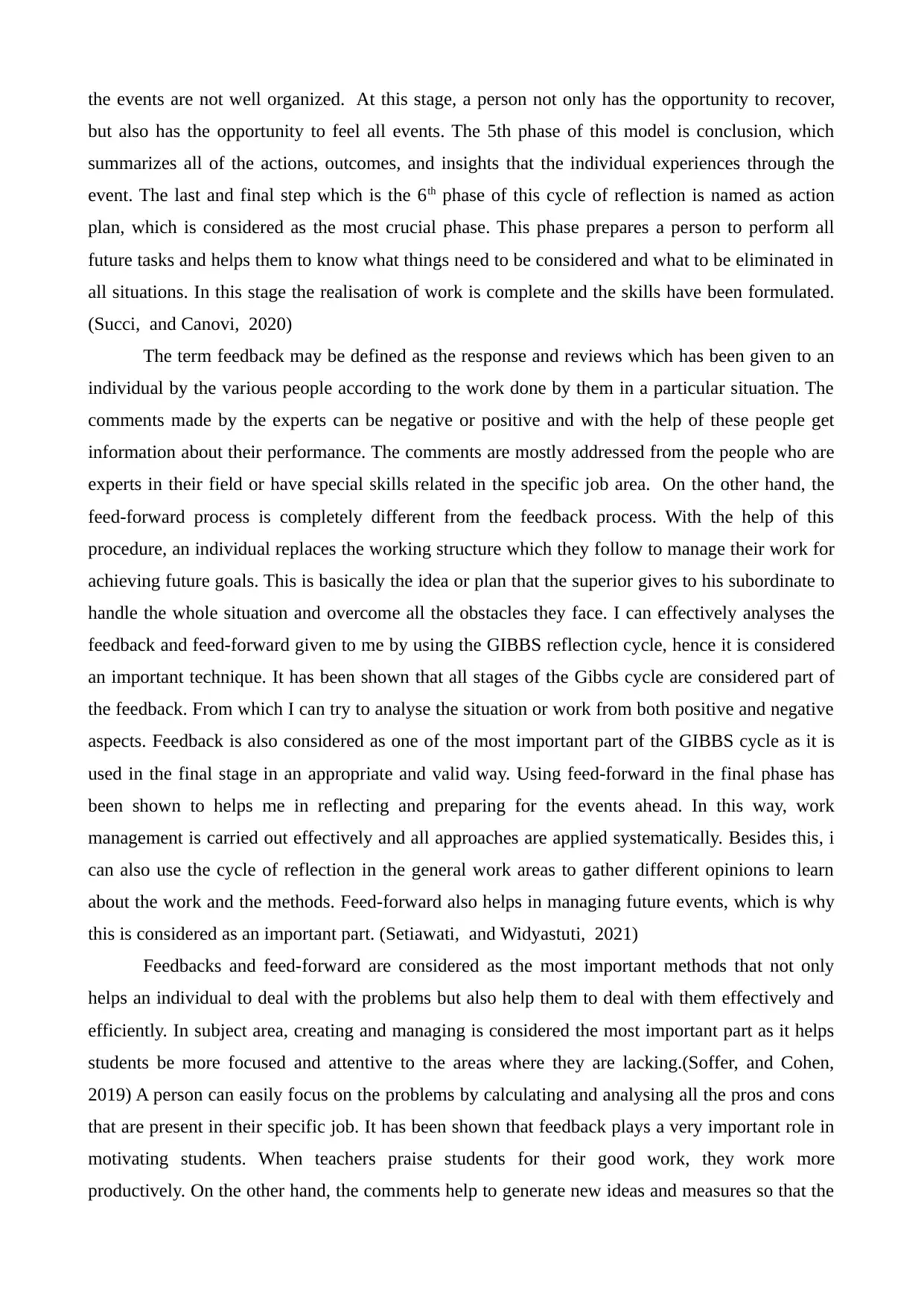
the events are not well organized. At this stage, a person not only has the opportunity to recover,
but also has the opportunity to feel all events. The 5th phase of this model is conclusion, which
summarizes all of the actions, outcomes, and insights that the individual experiences through the
event. The last and final step which is the 6th phase of this cycle of reflection is named as action
plan, which is considered as the most crucial phase. This phase prepares a person to perform all
future tasks and helps them to know what things need to be considered and what to be eliminated in
all situations. In this stage the realisation of work is complete and the skills have been formulated.
(Succi, and Canovi, 2020)
The term feedback may be defined as the response and reviews which has been given to an
individual by the various people according to the work done by them in a particular situation. The
comments made by the experts can be negative or positive and with the help of these people get
information about their performance. The comments are mostly addressed from the people who are
experts in their field or have special skills related in the specific job area. On the other hand, the
feed-forward process is completely different from the feedback process. With the help of this
procedure, an individual replaces the working structure which they follow to manage their work for
achieving future goals. This is basically the idea or plan that the superior gives to his subordinate to
handle the whole situation and overcome all the obstacles they face. I can effectively analyses the
feedback and feed-forward given to me by using the GIBBS reflection cycle, hence it is considered
an important technique. It has been shown that all stages of the Gibbs cycle are considered part of
the feedback. From which I can try to analyse the situation or work from both positive and negative
aspects. Feedback is also considered as one of the most important part of the GIBBS cycle as it is
used in the final stage in an appropriate and valid way. Using feed-forward in the final phase has
been shown to helps me in reflecting and preparing for the events ahead. In this way, work
management is carried out effectively and all approaches are applied systematically. Besides this, i
can also use the cycle of reflection in the general work areas to gather different opinions to learn
about the work and the methods. Feed-forward also helps in managing future events, which is why
this is considered as an important part. (Setiawati, and Widyastuti, 2021)
Feedbacks and feed-forward are considered as the most important methods that not only
helps an individual to deal with the problems but also help them to deal with them effectively and
efficiently. In subject area, creating and managing is considered the most important part as it helps
students be more focused and attentive to the areas where they are lacking.(Soffer, and Cohen,
2019) A person can easily focus on the problems by calculating and analysing all the pros and cons
that are present in their specific job. It has been shown that feedback plays a very important role in
motivating students. When teachers praise students for their good work, they work more
productively. On the other hand, the comments help to generate new ideas and measures so that the
but also has the opportunity to feel all events. The 5th phase of this model is conclusion, which
summarizes all of the actions, outcomes, and insights that the individual experiences through the
event. The last and final step which is the 6th phase of this cycle of reflection is named as action
plan, which is considered as the most crucial phase. This phase prepares a person to perform all
future tasks and helps them to know what things need to be considered and what to be eliminated in
all situations. In this stage the realisation of work is complete and the skills have been formulated.
(Succi, and Canovi, 2020)
The term feedback may be defined as the response and reviews which has been given to an
individual by the various people according to the work done by them in a particular situation. The
comments made by the experts can be negative or positive and with the help of these people get
information about their performance. The comments are mostly addressed from the people who are
experts in their field or have special skills related in the specific job area. On the other hand, the
feed-forward process is completely different from the feedback process. With the help of this
procedure, an individual replaces the working structure which they follow to manage their work for
achieving future goals. This is basically the idea or plan that the superior gives to his subordinate to
handle the whole situation and overcome all the obstacles they face. I can effectively analyses the
feedback and feed-forward given to me by using the GIBBS reflection cycle, hence it is considered
an important technique. It has been shown that all stages of the Gibbs cycle are considered part of
the feedback. From which I can try to analyse the situation or work from both positive and negative
aspects. Feedback is also considered as one of the most important part of the GIBBS cycle as it is
used in the final stage in an appropriate and valid way. Using feed-forward in the final phase has
been shown to helps me in reflecting and preparing for the events ahead. In this way, work
management is carried out effectively and all approaches are applied systematically. Besides this, i
can also use the cycle of reflection in the general work areas to gather different opinions to learn
about the work and the methods. Feed-forward also helps in managing future events, which is why
this is considered as an important part. (Setiawati, and Widyastuti, 2021)
Feedbacks and feed-forward are considered as the most important methods that not only
helps an individual to deal with the problems but also help them to deal with them effectively and
efficiently. In subject area, creating and managing is considered the most important part as it helps
students be more focused and attentive to the areas where they are lacking.(Soffer, and Cohen,
2019) A person can easily focus on the problems by calculating and analysing all the pros and cons
that are present in their specific job. It has been shown that feedback plays a very important role in
motivating students. When teachers praise students for their good work, they work more
productively. On the other hand, the comments help to generate new ideas and measures so that the
Paraphrase This Document
Need a fresh take? Get an instant paraphrase of this document with our AI Paraphraser
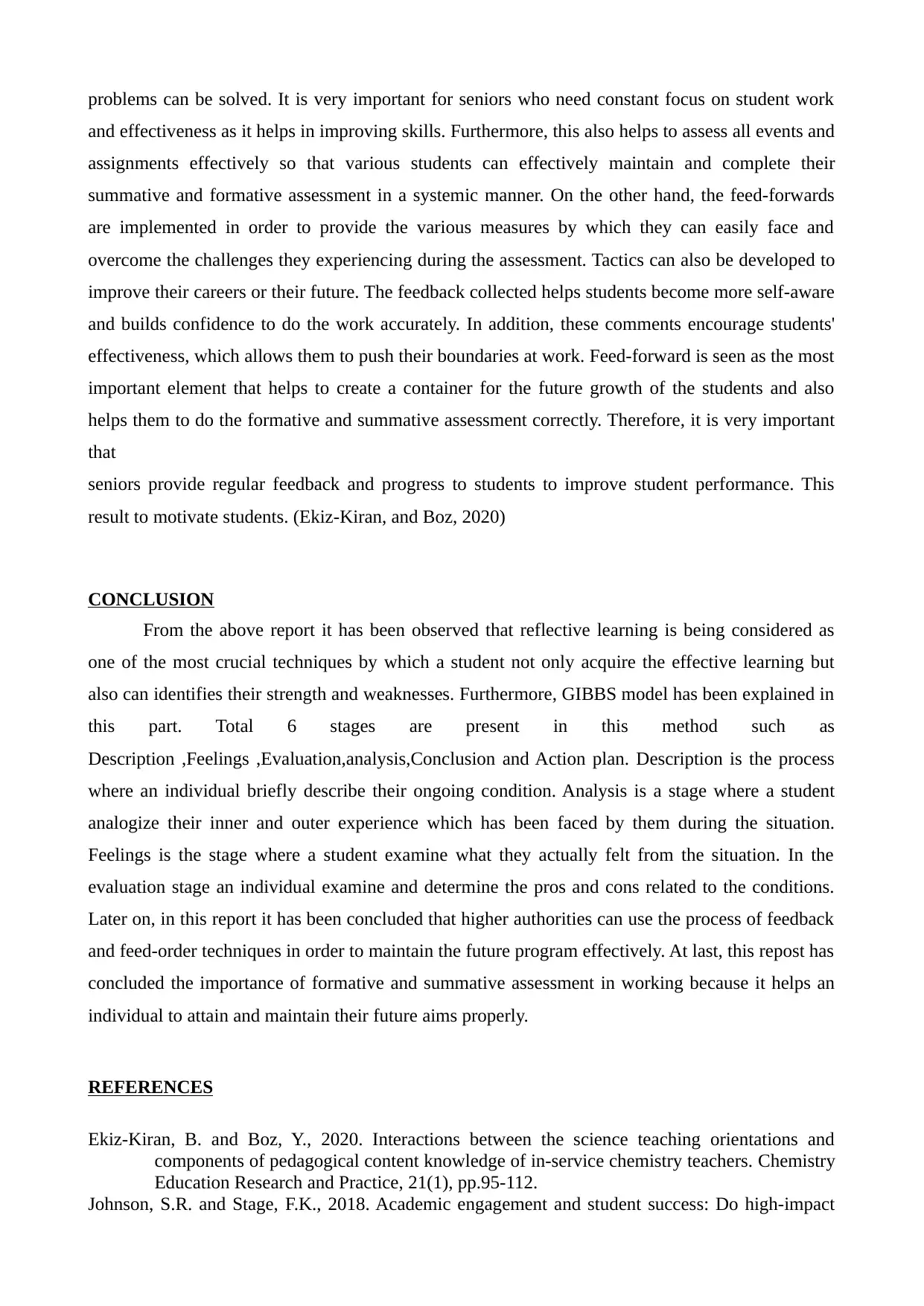
problems can be solved. It is very important for seniors who need constant focus on student work
and effectiveness as it helps in improving skills. Furthermore, this also helps to assess all events and
assignments effectively so that various students can effectively maintain and complete their
summative and formative assessment in a systemic manner. On the other hand, the feed-forwards
are implemented in order to provide the various measures by which they can easily face and
overcome the challenges they experiencing during the assessment. Tactics can also be developed to
improve their careers or their future. The feedback collected helps students become more self-aware
and builds confidence to do the work accurately. In addition, these comments encourage students'
effectiveness, which allows them to push their boundaries at work. Feed-forward is seen as the most
important element that helps to create a container for the future growth of the students and also
helps them to do the formative and summative assessment correctly. Therefore, it is very important
that
seniors provide regular feedback and progress to students to improve student performance. This
result to motivate students. (Ekiz-Kiran, and Boz, 2020)
CONCLUSION
From the above report it has been observed that reflective learning is being considered as
one of the most crucial techniques by which a student not only acquire the effective learning but
also can identifies their strength and weaknesses. Furthermore, GIBBS model has been explained in
this part. Total 6 stages are present in this method such as
Description ,Feelings ,Evaluation,analysis,Conclusion and Action plan. Description is the process
where an individual briefly describe their ongoing condition. Analysis is a stage where a student
analogize their inner and outer experience which has been faced by them during the situation.
Feelings is the stage where a student examine what they actually felt from the situation. In the
evaluation stage an individual examine and determine the pros and cons related to the conditions.
Later on, in this report it has been concluded that higher authorities can use the process of feedback
and feed-order techniques in order to maintain the future program effectively. At last, this repost has
concluded the importance of formative and summative assessment in working because it helps an
individual to attain and maintain their future aims properly.
REFERENCES
Ekiz-Kiran, B. and Boz, Y., 2020. Interactions between the science teaching orientations and
components of pedagogical content knowledge of in-service chemistry teachers. Chemistry
Education Research and Practice, 21(1), pp.95-112.
Johnson, S.R. and Stage, F.K., 2018. Academic engagement and student success: Do high-impact
and effectiveness as it helps in improving skills. Furthermore, this also helps to assess all events and
assignments effectively so that various students can effectively maintain and complete their
summative and formative assessment in a systemic manner. On the other hand, the feed-forwards
are implemented in order to provide the various measures by which they can easily face and
overcome the challenges they experiencing during the assessment. Tactics can also be developed to
improve their careers or their future. The feedback collected helps students become more self-aware
and builds confidence to do the work accurately. In addition, these comments encourage students'
effectiveness, which allows them to push their boundaries at work. Feed-forward is seen as the most
important element that helps to create a container for the future growth of the students and also
helps them to do the formative and summative assessment correctly. Therefore, it is very important
that
seniors provide regular feedback and progress to students to improve student performance. This
result to motivate students. (Ekiz-Kiran, and Boz, 2020)
CONCLUSION
From the above report it has been observed that reflective learning is being considered as
one of the most crucial techniques by which a student not only acquire the effective learning but
also can identifies their strength and weaknesses. Furthermore, GIBBS model has been explained in
this part. Total 6 stages are present in this method such as
Description ,Feelings ,Evaluation,analysis,Conclusion and Action plan. Description is the process
where an individual briefly describe their ongoing condition. Analysis is a stage where a student
analogize their inner and outer experience which has been faced by them during the situation.
Feelings is the stage where a student examine what they actually felt from the situation. In the
evaluation stage an individual examine and determine the pros and cons related to the conditions.
Later on, in this report it has been concluded that higher authorities can use the process of feedback
and feed-order techniques in order to maintain the future program effectively. At last, this repost has
concluded the importance of formative and summative assessment in working because it helps an
individual to attain and maintain their future aims properly.
REFERENCES
Ekiz-Kiran, B. and Boz, Y., 2020. Interactions between the science teaching orientations and
components of pedagogical content knowledge of in-service chemistry teachers. Chemistry
Education Research and Practice, 21(1), pp.95-112.
Johnson, S.R. and Stage, F.K., 2018. Academic engagement and student success: Do high-impact
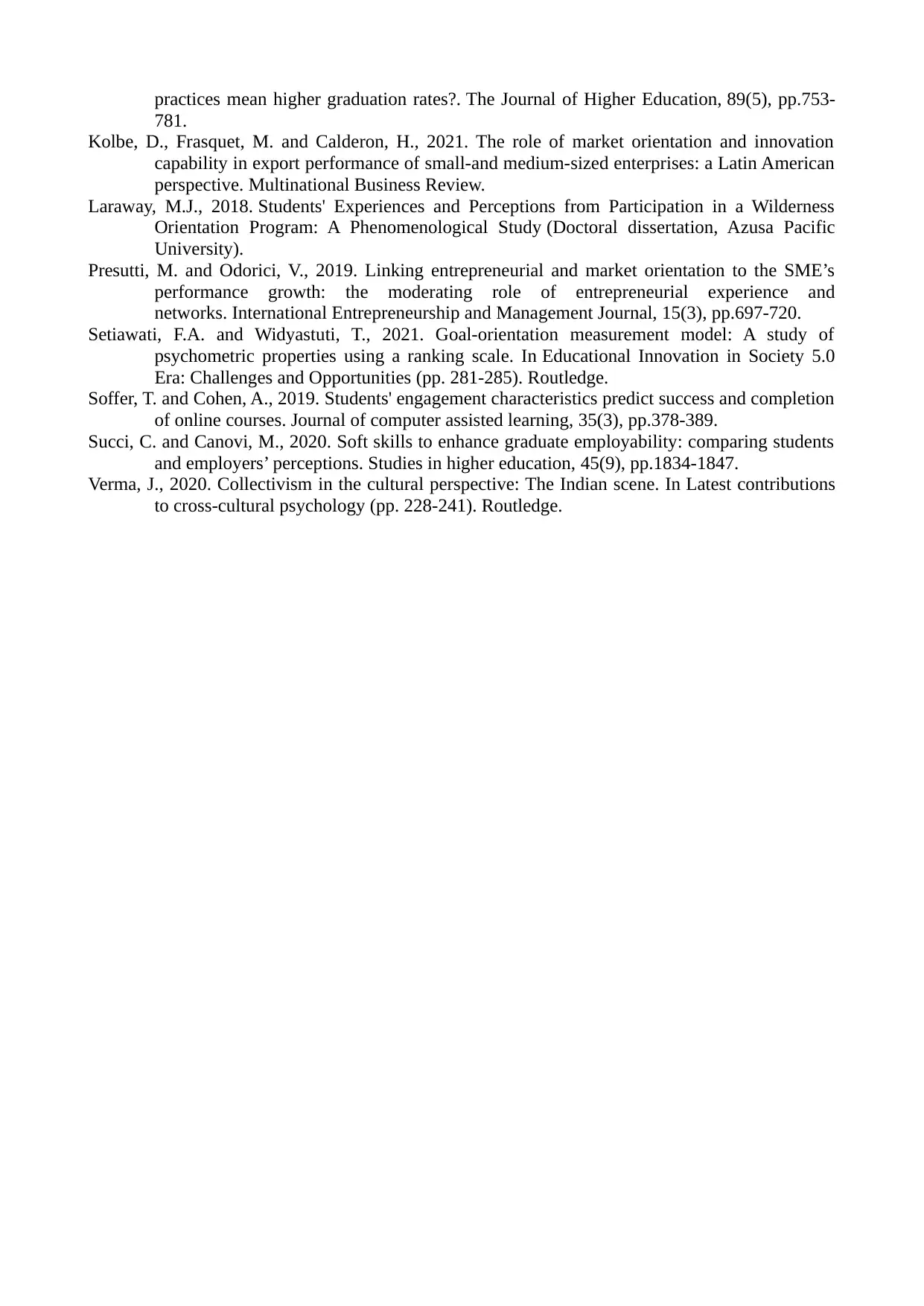
practices mean higher graduation rates?. The Journal of Higher Education, 89(5), pp.753-
781.
Kolbe, D., Frasquet, M. and Calderon, H., 2021. The role of market orientation and innovation
capability in export performance of small-and medium-sized enterprises: a Latin American
perspective. Multinational Business Review.
Laraway, M.J., 2018. Students' Experiences and Perceptions from Participation in a Wilderness
Orientation Program: A Phenomenological Study (Doctoral dissertation, Azusa Pacific
University).
Presutti, M. and Odorici, V., 2019. Linking entrepreneurial and market orientation to the SME’s
performance growth: the moderating role of entrepreneurial experience and
networks. International Entrepreneurship and Management Journal, 15(3), pp.697-720.
Setiawati, F.A. and Widyastuti, T., 2021. Goal-orientation measurement model: A study of
psychometric properties using a ranking scale. In Educational Innovation in Society 5.0
Era: Challenges and Opportunities (pp. 281-285). Routledge.
Soffer, T. and Cohen, A., 2019. Students' engagement characteristics predict success and completion
of online courses. Journal of computer assisted learning, 35(3), pp.378-389.
Succi, C. and Canovi, M., 2020. Soft skills to enhance graduate employability: comparing students
and employers’ perceptions. Studies in higher education, 45(9), pp.1834-1847.
Verma, J., 2020. Collectivism in the cultural perspective: The Indian scene. In Latest contributions
to cross-cultural psychology (pp. 228-241). Routledge.
781.
Kolbe, D., Frasquet, M. and Calderon, H., 2021. The role of market orientation and innovation
capability in export performance of small-and medium-sized enterprises: a Latin American
perspective. Multinational Business Review.
Laraway, M.J., 2018. Students' Experiences and Perceptions from Participation in a Wilderness
Orientation Program: A Phenomenological Study (Doctoral dissertation, Azusa Pacific
University).
Presutti, M. and Odorici, V., 2019. Linking entrepreneurial and market orientation to the SME’s
performance growth: the moderating role of entrepreneurial experience and
networks. International Entrepreneurship and Management Journal, 15(3), pp.697-720.
Setiawati, F.A. and Widyastuti, T., 2021. Goal-orientation measurement model: A study of
psychometric properties using a ranking scale. In Educational Innovation in Society 5.0
Era: Challenges and Opportunities (pp. 281-285). Routledge.
Soffer, T. and Cohen, A., 2019. Students' engagement characteristics predict success and completion
of online courses. Journal of computer assisted learning, 35(3), pp.378-389.
Succi, C. and Canovi, M., 2020. Soft skills to enhance graduate employability: comparing students
and employers’ perceptions. Studies in higher education, 45(9), pp.1834-1847.
Verma, J., 2020. Collectivism in the cultural perspective: The Indian scene. In Latest contributions
to cross-cultural psychology (pp. 228-241). Routledge.
⊘ This is a preview!⊘
Do you want full access?
Subscribe today to unlock all pages.

Trusted by 1+ million students worldwide
1 out of 6
Related Documents
Your All-in-One AI-Powered Toolkit for Academic Success.
+13062052269
info@desklib.com
Available 24*7 on WhatsApp / Email
![[object Object]](/_next/static/media/star-bottom.7253800d.svg)
Unlock your academic potential
Copyright © 2020–2026 A2Z Services. All Rights Reserved. Developed and managed by ZUCOL.

